'The year I lost my limbs was the most brilliant of my life'
- Published
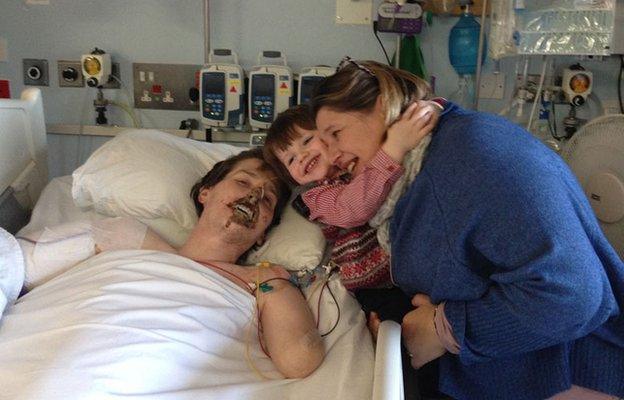
In a few weeks Alex Lewis went from being the owner of a pub, to becoming critically ill and a quadruple amputee. Yet he still describes the past year as the best he's ever had.
"There are days when I wake up and I think gosh my shoulder hurts, or wow my stumps are sore, but I just keep on pushing forward," Alex Lewis explains.
He's on speakerphone as he is unable to hold a phone now he has no hands.
As well as losing his limbs, Lewis also lost his lips and nose. Surgeons have since grafted skin from his shoulder into lips leaving him, he jokes, looking like a Simpsons character and with a nose that constantly runs.
The positivity 34-year-old Lewis, from Stockbridge, Hampshire, has found over the past year has been remarkable for those close to him, and he says he feels happier now than before his illness. Many would find it hard to believe, but he says that great things have come of it.
"It's made me think differently about being a dad, a partner, a human being," he says, and a new charity set up in his name has given him a huge impetus to help others. Despite this positive attitude, he can't do a lot of the things he once loved, like cooking and playing golf. He and his partner Lucy have lost the pub they once ran.
'Survival chance of 5%'
It was in November 2013 when Lewis thought he had "man flu", but when he spotted blood in his urine, followed by blotchy, bruised looking skin he knew something more serious was happening.
It turned out to be a streptococcal infection (type A) and he was rushed into hospital in Winchester on 17 November 2013. The infection penetrated deep into his tissues and organs, and triggered blood poisoning, or sepsis, a life-threatening condition that causes multiple organ failure.
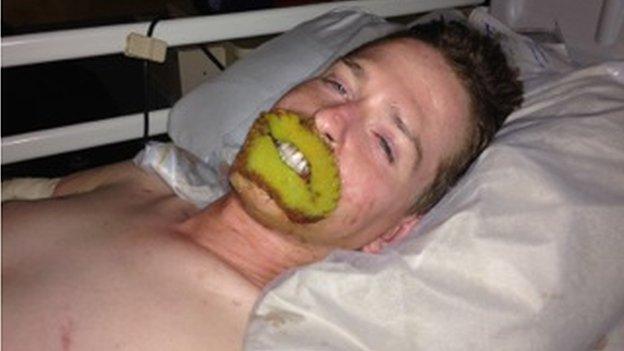
Alex Lewis's lips were completely destroyed by the infection
The skin on his arms and legs, and part of his face had quickly turned black and gangrenous. For his family and friends, at his bedside every day while he was on a life support machine, it was shocking to see.
But for his son Sam, just three at the time, it looked merely as though Daddy was covered in chocolate.
Lewis's infected limbs were starting to poison his body and, as soon as he was off life support, he was told he would have to have his left arm amputated above the elbow.
He says he felt no sadness or emotion at the news because the doctors were incredibly matter-of-fact. "It was a case of 'this arm is killing me so it has to go,'" he says.
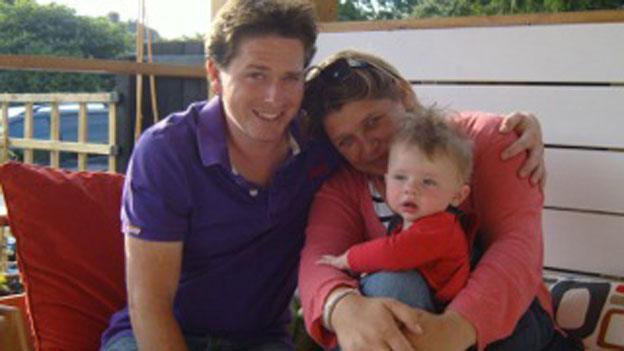
Lewis with his family before his illness
It was the second week of December and although he had lost an arm, he wasn't yet out of danger. His damaged legs were beginning to poison his body and, in quick succession he had two more operations to amputate first one leg, then the other, leaving him with just one limb - his right arm.
"I processed every amputation individually," he says. "Part of me thought let's just get this process done so I can get out of hospital and home." But ultimately he says he didn't have much time to think.
His right arm had been damaged too, but doctors thought there was a chance of saving it. It took 17-and-a-half hours in an operating theatre on Christmas Eve 2013 to rebuild it. Surgeons stripped the arm to scrape the dead tissue away. Then they took 16.5ins (42cm) of his left shoulder blade, along with the skin, muscle, nerves and tissue and grafted it on to his right arm.
Having lost three limbs already, use of that remaining hand was seen as crucial by doctors and Lewis was desperate to do what he could to keep it.
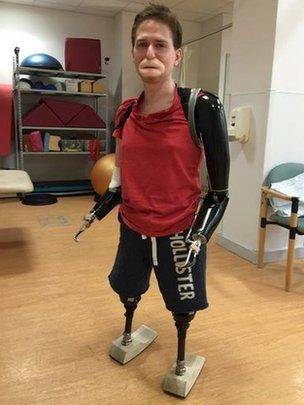
Lewis says his grafted lips make him look like a Simpsons character
"I learned along the way that all the quadruple amputees I've met say the one thing they'd kill for is a hand," Lewis says. "It means you can still do your daily stuff, get a drink, write."
But the damage proved to be too severe and, one night, while he was asleep, Lewis rolled over and snapped the arm in two.
"My hand was dangling down by my elbow," he says. His partner Lucy was devastated, and imagined a far harder life for him now he had no limbs - but Lewis says he didn't care.
"There is no point waiting for five years trying to get an arm working again," he says. "I think psychologically it would have been much more damaging to wait all that time and then lose it."
With all four limbs amputated, Lewis had to learn how to go about his new life. He could no longer get himself up and washed and dressed in the morning, so had to get used to a carer coming in once a day - but first on his to-do list was learning to walk.
He began a 10-week walking course at Queen Mary's Hospital in Roehampton but after just two weeks he surprised everyone by successfully walking on devices called "rocker pylons" - prosthetics on a short pole, with a large rocking foot.
He's been walking on them for almost three months now and says he is making great progress but still finds them awkward. "Going up stairs is difficult because of the shortness of them," he says, "and different terrains are hard."
He has chosen to use prosthetic arms and currently uses ones with hooks. His attitude is: "I might as well try what is best and then make my mind up."
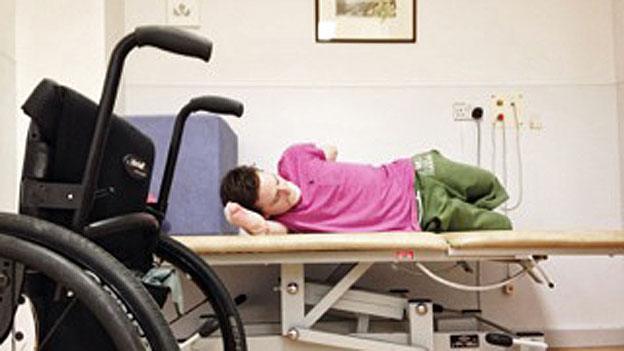
Physiotherapy is still an important part of Lewis's life
The prosthetics let him do things like open a fridge, pick up a drink or open a bag of sweets, actions which aren't possible using his stumps.
He says it still feels like he's living in a dream world and that it's all "a bit alien". Catching sight of himself in a mirror feels uncanny, he says, because the body he had become used to for 33 years has changed beyond his recognition.
"It can be upsetting but I just think it is incredible what the human body is able to overcome," he says.
Follow us on Twitter, external and on Facebook, external, and listen to our monthly talk show